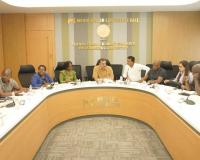Post-Budget Analysis Hosted by South Gujarat Chamber of Commerce & Industry

Surat, February 5 – Following the presentation of Union Budget 2025 by Union Finance Minister Nirmala Sitharaman on February 1, 2025, the South Gujarat Chamber of Commerce & Industry (SGCCI) hosted a Post-Budget Analysis session on Monday. The event featured an in-depth review by Mukesh Patel, a renowned tax consultant and founder of Practical Tax Planning, who provided expert insights into the key takeaways from the budget.
A Budget for India's Vision 2047
SGCCI President Vijay Mewawala remarked that at first glance, Union Budget 2025 appears to be a progressive budget, aligning with Prime Minister Narendra Modi's vision of a developed India by 2047. He highlighted that the budget includes several provisions for the poor, youth, farmers, MSME entrepreneurs, and women's empowerment, ensuring relief for the working class.
Major Tax Reforms & Relief for Middle-Class Taxpayers
Delivering his analysis, Mukesh Patel emphasized that budget analysis is a blend of art and science. He noted that while every budget incorporates welfare schemes for the poor, this is the first time the middle class has received significant tax relief. Patel highlighted the landmark decision of the government to provide income tax relief of up to ₹1,10,000 for individuals earning over ₹24 lakh annually.
Presenting a comparative analysis of personal tax structures over the past five years, Patel observed that most taxpayers file their income tax returns efficiently and receive their ITR refunds within 24 hours, indicating growing trust in the government’s taxation system. He emphasized that this budget focuses on personal taxation, investment planning, and capital formation, making it one of the best in recent years.
Patel also discussed investment opportunities, stating that an individual taxpayer can maintain two portfolios—one for investments and one for stock exchanges. This includes opening two demat accounts while adhering to regulatory norms.
Key Budgetary Provisions for Trusts & LRS
Surat, being home to numerous small and large charitable trusts, has seen stricter tax revenue regulations over the years. However, Patel noted that the budget provides some relief for trusts. He explained that renewal procedures have been revised, requiring trusts to apply for renewal in 2026, after which, if the average personal receipts (gross income without deductions) do not exceed ₹5 crore within two years, a 10-year renewal will be granted. Patel described these budget provisions for trusts as a welcome step.
Further, he noted that the Liberalized Remittance Scheme (LRS) limit has been increased from ₹7 lakh to ₹10 lakh, offering relief in education loans and changes in TDS and TCS policies. Patel concluded that the Union Budget 2025 is favorable for businesses, making compliance easier and more efficient.
Prominent Attendees & Panel Discussion
The event saw the participation of several distinguished figures, including SGCCI Vice President Nikhil Madrasi, Former President Ramesh Vaghasia, Honorary Secretary Neerav Mandalewala, and Treasurer Mrinal Shukla. The session was attended by chartered accountants, legal professionals, tax consultants, and SGCCI members.
CA Anuj Jariwala, Group Chairman of SGCCI, outlined the program’s structure, while Ashish Vakil, Vice President of the South Gujarat Income Tax Bar Association, introduced the speakers. The event was moderated by CA Pragnesh Jagsheth, Chairman of the SGCCI Income Tax Committee, and concluded with a vote of thanks by CA Mukesh Kabra, Vice President of the Chartered Accountants Association, Surat.
With the comprehensive insights provided at the event, business professionals and taxpayers gained a clearer understanding of the Union Budget’s implications, particularly regarding taxation, investments, and compliance policies.






